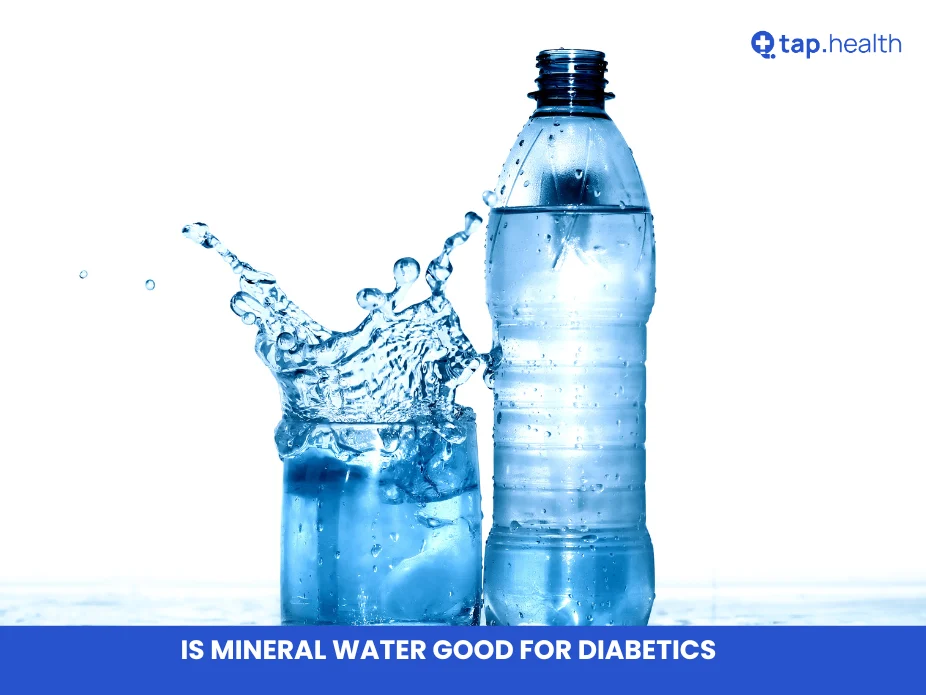When managing diabetes, choosing the right beverages can play a significant role in maintaining blood sugar levels. With so many drink options available, you may wonder: Is mineral water good for diabetics? The simple answer is: Yes, mineral water can be a healthy and beneficial choice for people with diabetes. In this blog, we’ll explore why mineral water is a suitable option and how it can fit into a diabetic diet.
What is Mineral Water?
Mineral water is water that comes from a natural source, often containing dissolved minerals such as magnesium, calcium, potassium, and sodium. These minerals are added to the water as it passes through rocks and underground layers, giving it a unique taste and potential health benefits.
Unlike regular tap water, mineral water can vary in mineral content depending on the source. It’s often considered a healthier alternative to sugary beverages, sodas, and even fruit juices, which can cause blood sugar spikes.
Why Mineral Water is Good for Diabetics
1. Zero Sugar and Carbohydrates
One of the best things about mineral water is that it contains zero sugar and carbohydrates, which is perfect for diabetics who need to keep an eye on their daily carbohydrate intake. Sugary drinks and high-carbohydrate beverages can cause spikes in blood sugar levels, leading to complications. With mineral water, you don’t need to worry about any sugar affecting your blood glucose levels.
2. Hydration and Kidney Health
Proper hydration is crucial for people with diabetes. Drinking enough water helps keep the kidneys functioning well, aids in the removal of toxins, and supports overall bodily functions. Dehydration is a common issue for diabetics, especially those with high blood sugar levels, which can lead to excessive urination and fluid loss.
Mineral water, with its rich mineral content, can also be beneficial for kidney health. Since kidney disease is a common complication of diabetes, maintaining proper hydration and mineral balance is essential.
Real-Life Scenario: Amit’s Experience with Hydration
Amit, a 55-year-old diabetic patient from Mumbai, struggled with dehydration and often felt fatigued. His doctor recommended increasing his water intake and switching to mineral water. After a few weeks, Amit noticed he had more energy and was less prone to dehydration, helping him better manage his diabetes.
3. Helps Maintain Electrolyte Balance
Mineral water contains important electrolytes like magnesium, calcium, and potassium, which play a vital role in maintaining a proper balance in the body. These minerals help regulate the body’s fluid balance, muscle function, and nerve function. For diabetics, maintaining this balance is crucial to prevent complications like cramps, muscle weakness, and even heart issues.
4. May Help Lower Blood Pressure
Some studies suggest that mineral water, especially water rich in magnesium and calcium, may help reduce blood pressure. High blood pressure is a common issue for people with diabetes, increasing the risk of heart disease and stroke. Therefore, mineral water can be a helpful addition to a diabetic’s diet in terms of blood pressure management.
Does Mineral Water Mess With Blood Sugar?
Here’s the golden question. Good news first: plain mineral water (still or sparkling) has zero carbs and zero sugar. That means it won’t raise your blood glucose. Zero. Zip. Nada. Studies from the CDC and Mayo Clinic confirm unsweetened waters—including mineral water—are safe for diabetics.
Minerals That Might Actually Help
Some minerals in mineral water play nice with blood sugar:
- Magnesium: Low levels are linked to insulin resistance. Mineral water can offer 5–15% of your daily magnesium in one bottle.
- Calcium: Helps insulin do its job. Weak bones are common in diabetics, so this is a double win.
- Bicarbonate: Found in waters like Vichy, it may help balance acidity in your body after high-sugar meals.
The Carbonation Question
Worried about fizzy water? Research in the Journal of Nutritional Science shows carbonation itself doesn’t affect blood sugar. But if bubbles make you burp up stomach acid (hello, heartburn!), opt for still mineral water.
3 Things to Watch Out For
Mineral water is generally safe—but not all bottles are created equal. Here’s what to avoid:
Sodium Bombs
Some mineral waters (like Vichy Catalan) are high in sodium—up to 1,100mg per liter! Too much sodium raises blood pressure, a huge risk for diabetics. ADA guidelines recommend under 2,300mg sodium daily. Always check the label. Aim for <50mg per serving.
“Flavored” Waters With Hidden Sugars
Brands like “Essentia Plus” or “Core Hydration” sneak in sugar or artificial sweeteners. Even “natural flavors” can contain traces of sugar. Red flag words: sucrose, fructose, cane juice, or “vitamin blend” (often code for sweeteners). Stick to brands with just two ingredients: “water” and “natural minerals.”
Carbonation and Digestion
If you have gastroparesis (delayed stomach emptying—a diabetes complication), carbonation can cause painful bloating. Try still mineral water or let sparkling water go flat before sipping.
How to Pick the Perfect Mineral Water
Read Labels Like a Pro
- Sodium: Choose <50mg per 8oz serving.
- Additives: Avoid anything beyond “natural carbonation” or “added CO2.”
- Mineral content: Look for magnesium (5–20mg per liter) and calcium (20–80mg per liter). Great budget picks: Gerolsteiner (German brand, high magnesium) or San Pellegrino (Italian, balanced minerals).
Best Types for Diabetics
- Top Choice: Still mineral water with moderate magnesium/calcium (e.g., Evian).
- Fizzy Fix: Plain sparkling water (e.g., Perrier). Skip the lemon/lime flavors unless verified sugar-free.
- Budget Hack: Buy gallon-sized still mineral water and add fresh cucumber or mint slices at home.
Mineral Water vs. Other Drinks: The Truth
Tap Water
Perfectly fine if your local supply is safe! But it lacks the extra minerals. If your tap water tastes metallic or chlorinated, a filter pitcher can help.
Sparkling Water (Non-Mineral)
Brands like LaCroix or Bubly are okay—but they contain no minerals. They’re just bubbly hydration. Avoid if you’re seeking magnesium benefits.
Diet Sodas & “Diabetic Drinks”
The ADA says diet sodas are “safe but not ideal.” Artificial sweeteners like aspartame may alter gut bacteria and increase sugar cravings long-term. Save them for rare treats. Mineral water is a cleaner daily choice.
Coconut Water & Fruit Juices
Even “unsweetened” versions pack 10–15g sugar per cup. They’ll spike blood glucose. Save them for post-workout recovery only if your levels are stable.
Expert Contributions: Dr. Kavita Rathi on the Benefits of Mineral Water
According to Dr. Kavita Rathi, a leading nutritionist based in Delhi, “Mineral water can be very beneficial for diabetics. It helps with hydration, electrolyte balance, and maintaining overall kidney health. However, it’s important to monitor sodium content, especially in people with high blood pressure.”
Dr. Rathi emphasizes that while mineral water is an excellent option, it’s important to choose mineral waters with lower sodium content if you’re concerned about managing high blood pressure.
Potential Concerns and Considerations
1. Sodium Content
Not all mineral waters are the same. Some mineral waters contain higher levels of sodium (salt), which can be harmful to diabetics, particularly those who also have high blood pressure. Consuming too much sodium can increase the risk of heart disease and worsen kidney problems.
Tip: Check the Sodium Label
Before purchasing mineral water, always check the sodium content on the label. Opt for mineral waters with lower sodium levels to avoid unnecessary risks.
2. Carbonated vs. Non-Carbonated Mineral Water
Mineral water comes in two varieties: carbonated and non-carbonated. The carbonation process adds bubbles to the water, giving it a fizzy texture. Some people enjoy the fizz, while others may find it uncomfortable.
For diabetics, the choice between carbonated and non-carbonated water depends on personal preference. However, some carbonated mineral waters may contain added sugars or artificial sweeteners. It’s important to choose a sugar-free option to avoid blood sugar spikes.
3. Avoiding Added Sugars or Flavorings
Sometimes, flavored mineral waters are available on the market. These waters may contain added sugars or artificial flavorings, which can negatively affect blood sugar levels. Always opt for unsweetened mineral water to keep it safe for your diabetic diet.
How Much Mineral Water Should a Diabetic Drink?
While there is no specific amount of mineral water recommended for diabetics, it’s important to stay properly hydrated throughout the day. The general guideline for hydration is to drink at least 8 glasses (about 2 liters) of water daily. If you’re consuming mineral water, you can include it in your daily hydration plan.
However, always listen to your body. If you’re thirsty or feel dehydrated, make sure to drink water or mineral water regularly to stay hydrated.
Recommendations Grounded in Proven Research and Facts
- Choose mineral water with low sodium: This is essential for managing blood pressure and kidney health, especially in diabetics.
- Opt for non-carbonated, unsweetened mineral water to avoid unwanted sugars or artificial sweeteners that can raise blood sugar levels.
- Stay hydrated: Proper hydration is important for diabetics to maintain kidney health, balance electrolytes, and keep blood sugar levels in check.
FAQ on Is Mineral Water for Diabetics
1. Is mineral water safe for diabetics?
Yes, mineral water is safe for diabetics as long as it is low in sodium and free from added sugars or artificial sweeteners.
2. Does mineral water raise blood sugar levels?
No, mineral water does not raise blood sugar levels because it contains zero carbohydrates and sugar.
3. Can mineral water help with dehydration in diabetics?
Yes, mineral water helps with hydration and can prevent dehydration, which is common in people with diabetes due to high blood sugar levels.
4. Should I choose carbonated or non-carbonated mineral water?
Both carbonated and non-carbonated mineral water are fine for diabetics, but be cautious with added sugars or artificial sweeteners in carbonated options.
5. How much mineral water should a diabetic drink daily?
Aim for at least 8 glasses (2 liters) of water daily, including mineral water, to stay hydrated and support overall health.
6. What is the best water for diabetics to drink?
The best water for diabetics is plain water, whether it’s filtered, mineral, or spring water. It helps flush out excess glucose through urine and keeps the body hydrated. For added benefits, diabetics can also drink:
- Mineral water – provides essential nutrients.
- Infused water – add slices of lemon, cucumber, or mint for flavor without sugar.
- Alkaline water – may help balance pH but should be consumed in moderation.
Avoid flavored or sweetened bottled waters, as they may contain hidden sugars or artificial sweeteners.
7. Is mineral water high in sugar?
No, mineral water does not contain sugar. It is a naturally sugar-free beverage that provides hydration and essential minerals without affecting blood glucose levels. However, it’s important to check labels on flavored or carbonated mineral waters, as some brands may add sweeteners, sodium, or preservatives that are less ideal for diabetics.
8. Which sparkling water is best for diabetics?
The best sparkling waters for diabetics are unsweetened and naturally carbonated options with no added sugar or artificial flavors. Good choices include:
- Perrier Natural Sparkling Water
- San Pellegrino Sparkling Natural Mineral Water
- LaCroix (unsweetened flavors)
- Spindrift (with real fruit juice, no added sugar)
These beverages are safe, refreshing, and blood sugar–friendly, providing a healthy alternative to sugary sodas or sweetened drinks.
Conclusion
Mineral water is a great beverage option for diabetics, as it provides essential minerals and helps with hydration without affecting blood sugar levels. By choosing a low-sodium, unsweetened, non-carbonated version, you can reap the benefits of mineral water without worrying about side effects. Always make informed choices and consult with your healthcare provider to determine the best hydration plan for your needs.



